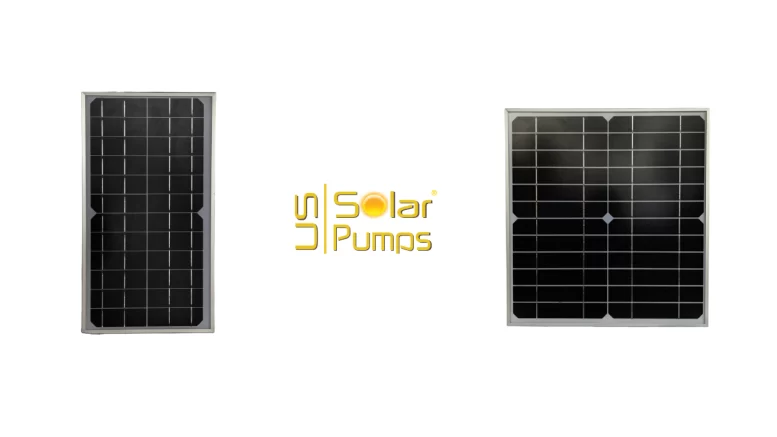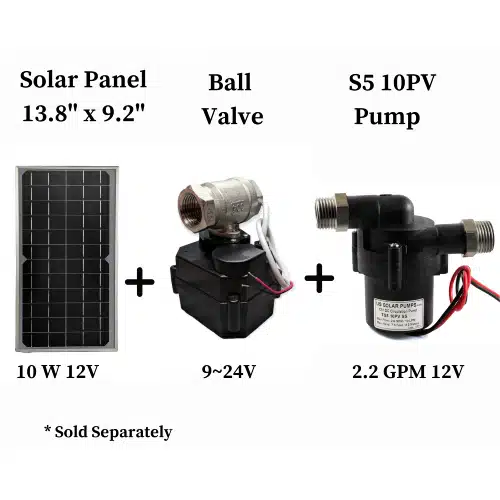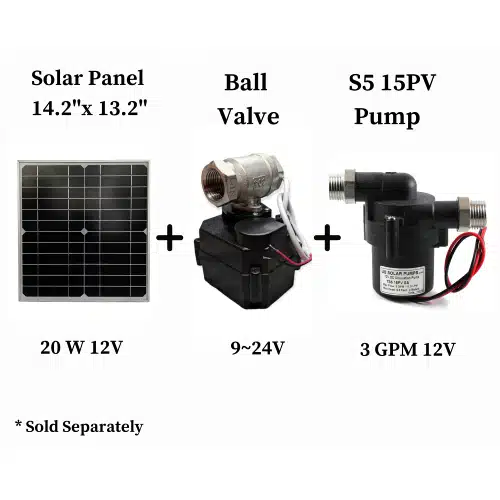We are very excited to share with you the news that we now carry solar panels! We have two to add to our catalogue: the 12V 10-Watt and 20-Watt Solar Panels. Over the years we have sold many DC and solar powered pumps but one thing we were missing were solar panels!
Why do we now carry 12V Solar Panels?
Primarily because 12V solar panels are not the norm. Our solar pumps, especially our S5 series, work best off of a 12V PV panel.
Solar panels start building current as the sun rises and at peak sun they will also peak over their rated voltage, which can cause the over-voltage protection design in the pump to activate and shut off.
Having the right solar panel with the right voltage will keep your pump in its best condition and you won’t have to worry about over-voltage.
The 10-Watt 12V Solar Panels
The 10-Watt PV panel pairs perfectly with our 12V S5 Solar Hot Water pump and our CWX Ball Valve, as pictured below:
The 20-Watt 12V Solar Panels
This PV panel is perfect for customers who want their pump to come to full speed a little earlier in the morning. The wattage can be higher than the pump’s minimum requirement without adversely affecting it.
Solar panels have been around since the 1950s. Ever since then, they have become more commercial and easily obtainable by the majority of the population. So, why are 10 watt solar panels a great option for water pumps?
Solar panels have become increasingly popular as a source of renewable energy in recent years. One type of solar panel that has gained popularity among outdoor enthusiasts and RV owners is the 12 volt solar panel. In this blog, we will explore what 12 volt solar panels are, how they work, and their benefits.
What are 12 volt solar panels?
A 12 volt solar panel is a photovoltaic panel that generates electricity from sunlight. They are designed to charge 12 volt batteries, making them ideal for use in RVs, boats, and other outdoor applications. They come in a variety of sizes, from small portable panels to larger, more powerful panels that can be mounted on the roof of an RV or boat.
How do 12 volt solar panels work?
Solar panels work by converting sunlight into electricity. When sunlight hits the solar cells in the panel, it excites the electrons, creating a flow of electricity. The electricity generated by the solar panel is then sent to a charge controller, which regulates the flow of electricity to the battery.
The charge controller ensures that the battery is charged at the correct voltage and prevents overcharging, which can damage the battery. Once the battery is fully charged, the charge controller will stop the flow of electricity to the battery to prevent overcharging.
What are the benefits of 12 volt solar panels?
There are several benefits to using 12 volt solar panels, including:
1. They are a clean source of energy – Unlike fossil fuels, solar panels do not produce any harmful emissions or pollutants.
2. They are renewable – Solar energy is a renewable resource, meaning it will never run out.
3. They are quiet – Unlike generators, which can be noisy, solar panels generate electricity silently.
4. They are low maintenance – Once installed, solar panels require very little maintenance.
5. They can save money – By using solar panels to charge your batteries, you can save money on your energy bills.
6. They are portable – Small 12 volt solar panels are portable and can be taken with you on camping trips or other outdoor adventures.
Conclusion
12 volt solar panels are a clean, renewable, and quiet source of energy that are ideal for use in RVs, boats, and other outdoor applications. They offer several benefits, including low maintenance, portability, and the ability to save money on energy bills. If you are considering using solar panels to power your outdoor adventures, a 12 volt solar panel may be the perfect solution for you.
If you have any questions or doubts, please feel free to contact us. We’ll be happy to help you.
Follow us on Facebook, Twitter, Instagram, Pinterest, and YouTube for posts and updates to our shop. Also, take a look at our blog posts: Do you have to submerge a submersible pump? and A New Ball Valve for Thermo-syphoning.



